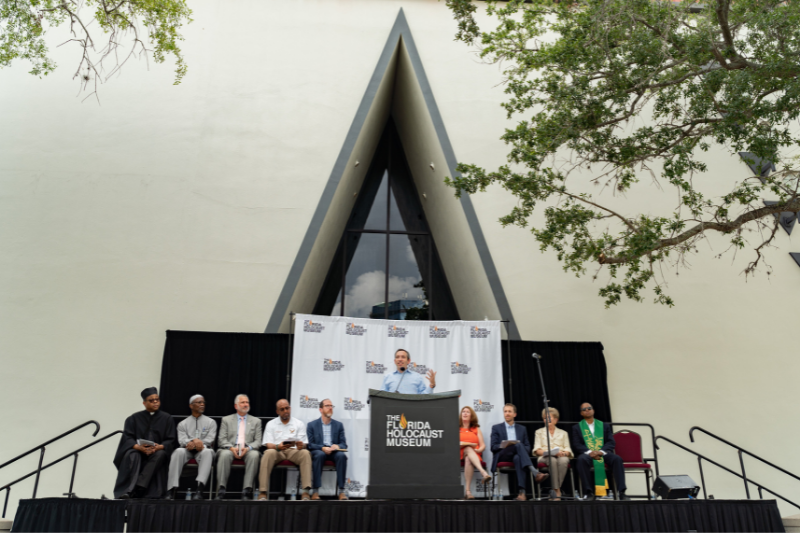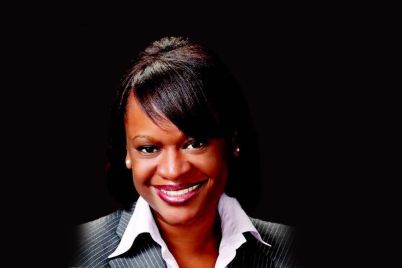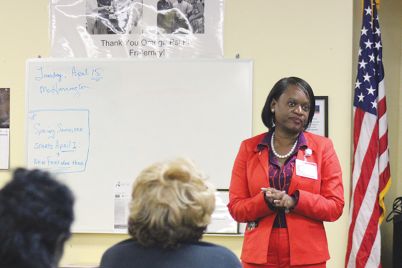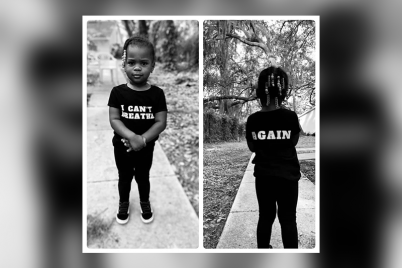A large, diverse crowd of all ages, races, and faiths attended the Unite Against Hate vigil held in front of the Holocaust Museum in a show of solidarity on Thursday, June 3. Photo courtesy of Mengshin Lin | Tampa Bay Times
BY MARK PARKER, Staff Writer
ST. PETERSBURG — Last Thursday evening, a week to the day after the Florida Holocaust Museum was vandalized, St. Petersburg came together to show that it is a city united.
A large, diverse crowd of all ages, races, and faiths attended the vigil in a show of solidarity. It was held in front of the museum at 55 Fifth St. S, with the intersections of First Avenue South and Central Avenue blocked by police. There was a strong police presence, and St. Petersburg Police Chief Anthony Holloway was personally in attendance.
“This means a lot,” Holloway said before the vigil. “It shows our city won’t tolerate this. We don’t want this; we are united.”
Chief Holloway said they were still looking for suspects in the vandalism that occurred May 27. Around 4 a.m. that morning, officers noticed a swastika and “Jews are guilty” spray-painted in black on the side of the museum. The city had it painted over by 9:15 a.m. that same morning.
The vigil began with music and prayer, with local musician and Arts Conservatory for Teens CEO Alex Harris playing a rousing rendition of his song Humanity, with its refrain of “We’re all human” speaking to the moment.
Many local politicians, both democrat and republican, were in the crowd to show their support. State Commissioner of Agriculture and gubernatorial candidate Nikki Fried – the first Jewish woman to ever be elected to state office – also made the trip to show her support.
Fried, who has made many trips to Israel and was sworn in on the first Hebrew Bible printed in the United States, said being at the vigil had “tremendous meaning” to her.
“Unless leaders step up to fight hate, it will come back again,” Fried said.
The vigil also caught the attention of the Biden administration, as the museum received a letter from White House Senior Advisor Cedric Richmond. Holocaust Museum Executive Director Elizabeth Gelman, read it aloud to the crowd. It stressed the importance of Jewish Americans to the country, the importance of the museum’s work, and how “hate must be condemned and countered.”
Attendees were asked to bring a book that is meaningful to them, as did the speakers. Many brought books dealing with racial equality and hopes for a better future. A theme of the event was that education is the only solution to stopping anti-Semitism, and the books were a symbol of that message.
Many religious leaders were on stage to speak, including both Rabbis and Imams. Several interfaith leaders also led prayers and addressed the crowd, embodying the spirit of unity through differences.
The only elected official to address the crowd, Mayor Rick Kriseman, said that it “breaks his heart” that incidents like the vandalism on the museum are on the rise. According to the Anti-Defamation League, there were 2,024 antisemitic incidents in the county, a decline of four percent from 2019 but still the third-highest year on record.
“This is a city where everyone can thrive, regardless of their beliefs and faith,” said Kriseman. “My hope is that St. Pete can be an example for the rest of the country.”
Toni Rinde, a Holocaust survivor and board member of the museum, told the crowd that she wanted to cry when she first heard the news of what happened to the museum.
“But then I said, ‘No,’” Rinde said. “That’s what these despicable people want, and they will not win.”
Rinde went on to tell the story of how as a baby, her parents had to leave her with a complete stranger that gave her a new identity so that she may have the chance to live. She explained that many Catholics lost their lives protecting Jews like her and how it is still essential for those with different beliefs to look out for each other.
“When someone sees wrong, teach them to fix wrong,” Rinde said.
Gelman gave three key directives to the crowd moving forward: To be an ambassador for the museum in the community and beyond, reach out to school districts and demand fact-based education regarding the Holocaust, and support their mission financially.
“After the vigil, there has to be vigilance,” said Rev. Kenny Irby, pastor of Bethel AME Church.








